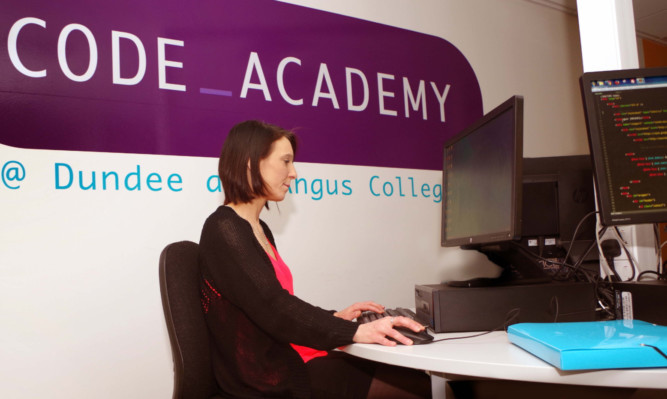Dundee and Angus College has developed a new programme to combat a skills shortage in computing.
The college has set up a Code Academy which will reach out to primary and secondary schools, universities and industry to help turn Scotland into a world-class digital nation by 2020.
Government figures estimate as many 84,000 people are already working in Scotland’s digital technologies industry, which continues to grow faster than any other sector in the country.
But the rapid growth of the £4 billion industry las left many employers voicing concerns about being able to find the right people.
The skills gap is exacerbated with high salaries tempting talent away from teaching into the industry, leading to fewer young people progressing to computer science at college or university.
“While the demand for people with software development skills is growing, the number of those entering into this area of study is at best stagnating and in some places actually dropping,” said Simon Hewitt, head of creative industries at D&A College.
“There is also a real problem in terms of gender inequality in this area with too few females opting for higher or advanced higher computing even in the schools where there is good provision.
“In a bid to meet these challenges, D&A Code Academy aims to inspire young people to opt for computing at school and further training in tertiary education by forming firm partnerships with schools, universities and industry.”
The academy will set up code camps for primary school pupils during the Easter and summer holidays, which will see the college throw open its doors during the spring and summer holidays for children keen to gain screen training.
There will also be weekend camps for primary pupils while secondary pupils will be encouraged to come to code workshops.
College staff have also planned a series of short courses for those teaching in schools to help support their personal development in the computing and digital media field.
“It is estimated that the sector will need an extra 11,000 new recruits each year to meet current and future demands and our new Code Academy should help deliver these numbers,” said Mr Hewitt.
“We will be offering code dens at primary school to introduce basic skills, weekend and holiday camps, code workshops, with those taking part moving on to our senior phase courses in software and games development.
“The transition becomes seamless with foundation and modern apprenticeship schemes and full-time software development or computer science courses on offer.”
